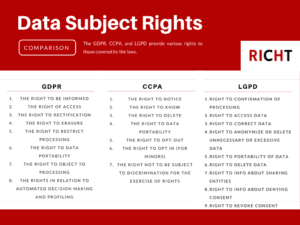A Changing Privacy Landscape

Over the past decade, we have swiftly entered a world where data is seemingly omnipresent in almost every area of life. With so much data created and stored, a myriad of privacy concerns are brought to the fore. In response, we see the implementation of laws and regulatory frameworks at a rapid pace on the national and international levels. As a result, a new formation of the privacy landscape is occurring, and organizations need to stay ahead of the curve by understanding these dynamic changes.
The Evolving Data Landscape
Ever since the internet and computing went mainstream, the world has been on a drastic and progressively changing trajectory. These changes have brought immense benefits, from increased innovation to easier communication, improving convenience, health, and safety globally. Yet, these advancements, particularly the new data-based frameworks of the internet, also present novel challenges, particularly in protecting individual privacy.
Data: The New Currency and Its Perils
As we continually move toward a data-focused ecosystem, individuals are encouraged, if not mandated, to provide a wealth of information. Entities collecting this data range from governments fulfilling national security and social service obligations to private internet giants like Google and Facebook, as well as local healthcare providers and retailers. The rationale is simple: data is, in many ways, the new oil. For practically all sectors, possessing relevant data means accomplishing organizational goals more effectively and efficiently, fueling higher profits, better user engagement, and more secure societies.
However, where data goes, danger often follows. The inherent value of data leads to its storage for indefinite periods. With vast amounts of data retained and its potential value for various threat actors, there is ample motivation for unauthorized access, leading to a rapid increase in data breaches over the past two decades. The actual damage depends on an organization’s security systems, overall risk profile, and breach response. Many organizations are only now fully recognizing these emerging threats.
Regulatory Responses: A Global Phenomenon
With data breaches occurring frequently and consumer displeasure becoming more pronounced, lawmakers globally have been increasingly focusing on regulating the storage and use of personal information. There is a general sentiment among regulators that organizations may not be taking system integrity and users’ privacy seriously enough. This has led to waves of comprehensive privacy and data protection laws on international, national, and state levels, carrying significant penalties for violations.
Foundations of Privacy Law
The origins of privacy laws are complex and varied. In the United States, much of the basis for privacy law stems from the 4th Amendment, which, though restricting government action, intertwines individual privacy and liberty. It states: “The right of the people to be secure in their persons, houses, papers, and effects, against unreasonable searches and seizures, shall not be violated…”
For European Union (EU) member states, the Universal Declaration of Human Rights (UDHR), proclaimed on December 10, 1948, set the tone. Article 12 states: “No one shall be subjected to arbitrary interference with his privacy, family, home or correspondence, nor to attacks upon his honour and reputation.” The EU’s General Data Protection Regulation (GDPR) stems from this underlying theme.
The Current Privacy Law “State of Play” – 2025 and Beyond
| Law | Acronym | Effective Date |
|---|---|---|
| General Data Protection Regulation | GDPR | May 25, 2018 |
| California Consumer Privacy Act | CCPA | Jan 1, 2020 |
| California Privacy Rights Act | CPRA | Jan 1, 2023 |
| Delaware Personal Data Privacy Act | DPDPA | Jan 1, 2025 |
| Iowa Consumer Data Protection Act | ICDPA | Jan 1, 2025 |
| Nebraska Data Privacy Act | NDPA | Jan 1, 2025 |
| New Hampshire Privacy Act | NHDPA | Jan 1, 2025 |
| New Jersey Data Privacy Act | NJDPA | Jan 15, 2025 |
| Tennessee Information Protection Act | TIPA | July 1, 2025 |
| Minnesota Consumer Data Privacy Act | MCDPA | July 31, 2025 |
The proliferation of data collection and its ubiquitous use have generated significant focus from citizens and lawmakers, leading to a sea change in the legal landscape. As of 2025, privacy law remains incredibly dynamic, with new regulations emerging and existing ones evolving.
United States: A Patchwork Intensifies
The U.S. continues to develop a fragmented framework of state-level privacy laws, with 2025 marking a significant year for new regulations. Businesses must navigate varying requirements in the absence of a comprehensive federal privacy law. For guidance on navigating this complex environment, consider exploring Privacy & Cybersecurity services.

- New State Laws in 2025: Eight new comprehensive state privacy laws are taking effect in 2025, adding to the complexity for businesses. These include:
- Delaware Personal Data Privacy Act (DPDPA): Effective January 1, 2025. Notably, it applies to nonprofits and requires universal opt-out mechanisms by January 1, 2026.
- Iowa Consumer Data Protection Act (ICDPA): Effective January 1, 2025.
- Nebraska Data Privacy Act (NDPA): Effective January 1, 2025.
- New Hampshire Data Privacy Act (NHDPA): Effective January 1, 2025.
- New Jersey Data Privacy Act (NJDPA): Effective January 15, 2025.
- Tennessee Information Protection Act (TIPA): Effective July 1, 2025.
- Minnesota Consumer Data Privacy Act (MCDPA): Effective July 31, 2025.
- Maryland Online Data Privacy Act (MODPA): Effective October 1, 2025. This law is noted for its stringent requirements.
These laws generally require businesses to provide clear privacy notices, such as via a privacy policy, implement reasonable data security, conduct data protection assessments, obtain consent for sensitive data, honor consumer rights, and establish contracts with data processors. Cure periods for violations vary by state. For more details on these new regulations, see New State Privacy Laws Set To Take Effect In 2025.
- California (CCPA/CPRA): The California Consumer Privacy Act (CCPA), as amended by the California Privacy Rights Act (CPRA), continues to be actively enforced.
- Beginning January 1, 2025, monetary damages, administrative fines, and civil penalties for CCPA violations are increasing.
- The California Privacy Protection Agency (CPPA) is active in enforcement, highlighted by a March 2025 settlement with Honda. The law has also been updated to include neural data under “sensitive” personal information.
- Common Themes in U.S. State Laws: While nuances exist, several themes are common across state laws: extraterritorial application, applicability thresholds (often based on revenue or volume of data processed), exemptions (e.g., for entities subject to federal laws like HIPAA or GLBA, or for non-profits in some states), heightened protections for sensitive data (with some requiring opt-in consent), and core obligations such as privacy notices (see privacy policy considerations), data minimization, cybersecurity, risk assessments, and honoring consumer rights (access, deletion, correction, opt-out of sales/sharing and targeted advertising). Understanding and operationalizing Data Subject Access Requests (DSARs) is crucial.
European Union: GDPR Enhancements
The EU’s GDPR framework continues to evolve.
- Major GDPR Updates for 2025: Significant updates may include expanded definitions of personal data, new rules for AI and machine learning, stricter requirements for cross-border data transfers, and enhanced enforcement mechanisms.
- Enhanced Data Subject Rights: Individuals have more control, including the right to object to automated decision-making, enhanced data portability rights, and the “right to be forgotten” (erasure) with stricter timelines (e.g., 14 days for erasure requests).
- Focus on Right to Erasure: The European Data Protection Board (EDPB) launched a coordinated enforcement action in 2025 focusing on the implementation of the right to erasure (Art. 17 GDPR), as it is a frequently exercised right and a common subject of complaints.
United Kingdom: Post-Brexit Evolution
The UK is also updating its data protection landscape.
- Updated Data Bill: The Data (Use and Access) Bill includes significant changes, such as new requirements for services likely to be accessed by children, an amended definition of “scientific research,” new clauses on the use of web crawlers for AI (requiring copyright compliance and disclosure), and new offenses related to creating deepfake intimate images.
- Increased ICO Fees: The UK government has increased data protection fees payable to the Information Commissioner’s Office (ICO).
HIPAA’s Enduring Importance
The Health Insurance Portability and Accountability Act (HIPAA), while an older framework focused on health-related information, remains more relevant than ever in today’s data-centric world. Organizations handling health data must ensure ongoing compliance. Expertise in sector-specific laws like HIPAA is vital.
The privacy landscape has undergone a remarkable transformation, driven by technological advancements and evolving consumer expectations. Businesses face a complex web of privacy laws, demanding greater transparency, accountability, and user control over personal data. Organizations that have already invested in robust privacy programs to meet existing regulations like CCPA or GDPR may find themselves better positioned, but will still likely need adjustments.
Effective privacy compliance programs are essential. Privacy lawyers play a crucial role by monitoring changes in privacy laws, advising on necessary updates to maintain compliance, assisting with data mapping, drafting and updating privacy policies, managing DSARs, negotiating Data Processing Agreements (DPAs), and providing training. For an overview of what a privacy policy should include, see Privacy Policy Compliance Explained and A Lawyer’s Role.
Takeaways
Data is a new currency, but its proliferation brings new challenges and regulatory pressures. As technology, particularly data-driven systems, continues to advance, the legal frameworks governing data privacy will also continue to evolve, and new privacy legislation will continue to proliferate. Organizations must remain vigilant, proactive, and adaptable. Strategies tailored to your particular circumstances are crucial for ensuring compliance and protecting your organization from legal risks and reputational harm.


Leave a Comment
(0 Comments)